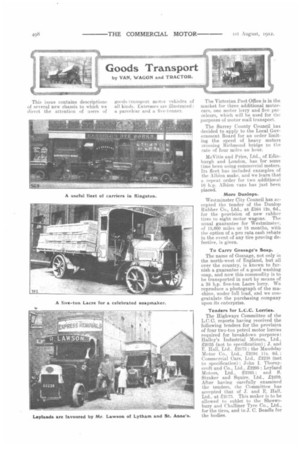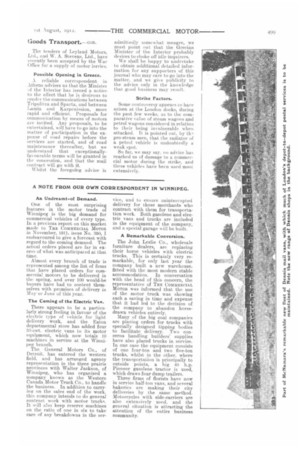Goods Transport
Page 16

Page 17

If you've noticed an error in this article please click here to report it so we can fix it.
by VAN, WAGON and TRACTOR.
This issue contains of several new chassis direct the attention descriptions to which we of users of goods-transport motor vehicles of all kinds. Extremes are illustrated: parcelcar and a live-tortner. The Victorian Post Office is in the market for three additional motorcars, one motor lorry and five parcelcars, which will be used for the purposes of motor mail transport.
The Surrey County Council has decided to apply to the Local Government Board for an order limiting the speed of heavy motors crossing Richmond bridge to the rate of four miles an hour.
McVitie and Price, Ltd., of Edinburgh and London, has for some time been using commercial motors. Its fleet has included examples of the Albion make, and we learn that a repeat order for two additional 16 h.p. Albion vans has just been placed.
More Dunlops.
Westminster City Council has accepted the tender of the Dunlop Rubber Co., Ltd., at 2564 12s. 6d., for the provision of new rubber tires to eight motor wagons. The usual guarantee for Westminster, of 15,000 miles or 18 months, with the option of a pro rata cash rebate in the event of any tire proving defective, is given.
To Carry Gossage's Soap.
The name of Gossage, not only in the north-west of England, but all over the country, is known to furnish a guarantee of a good washing soap, and now this commodity is to be transported in part by means of a 38 h.p. five-ton Lacre lorry. We reproduce a photograph of the machine, under full load, and we congratulate the purchasing company upon its enterprise.
Tenders Tor L.C.C. Lorries.
The Highways Committee of the L.C.C. reports having received the following tenders for the provision of four two-ton petrol motor lorries required for breakdown purposes: Halley's Industrial Motors, Ltd., 22035 (not to specification) ; J. and E. Hal], Ltd., £2173; the Maudslay Motor Co., Ltd., 22194 Hs. 6d. ; Commercial Cars. Ltd., 22238 (not to specification): John I. Thornycroft and Co., Ltd., £2295; Leyland Motors, Ltd., £2325; and S. Straker and Squire, Ltd., .22489. After having carefully examined the tenders, the Committee has accepted that of J. and E. Hall, Ltd., at 22172. This maker is to be allowed to sublet to the Shrewsbury and Challiner Tyre Co., Ltd., for the tires, and to J. C. Beadle for the bodies.
The tenders of Leyland Motors, Ltd., and W. A. Stevens, Ltd., have re.cently been accepted by the War Office for a supply of motor lorries.
Possible Opening in Greece.
I. reliable correspondent in Athens advises us that the Minister :)f the interior has issued a notice to the effect that he is desirous to render the communications between Tripolitza and Sparta, and between Latnia, and Karpenission, more rapid and efficient.. Proposals for communication by means of motors .are invited. Any proposals, to be entertained, will have tor into the matter of participation in the expense of road repairs before the services are started, and of road maintenance thereafter, but we understand that exceptionallyfavourable terms will be granted in the concession, and that. the mail contract will go with it. Whilst the foregoing advice is admittedly somewhat meagre, we must point out that the Grecian Minister of the Interior probably desires to choke off idle inquirers.
We shall be, happy to undertake to obtain additional detailed information for any supporters of this journal who may care to go into the matter, and we give publicity to the advice only in the knowledge that good business may result.
Strike Factors.
Some controversy appears to have arisen at the London docks, during the past few weeks, as to the comparative value of steam wagons and petrol wagons considered in relation to their being invulnerable when attacked. it is pointed out, by th pro-steam men, that the radiator of a petrol vehicle is undoubtedly a weak spot.
So far, we may say. no advice has reached us of damage to a commercial motor during the strike, and these vehicles have been used most extensively.






















